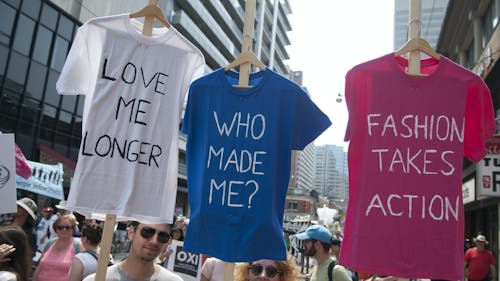RU Thrifty combines community service with sustainable fashion

RU Thrifty, an organization dedicated to sustainability in the fashion industry, was recently approved as a formal club after previously operating as a provisional campaign under Students for Environmental Awareness.
The club seeks to create a safe environment for students to discuss issues in clothing production ranging from unsustainable water usage and material sourcing to unethical treatment of laborers to the aftermath of clothing that gets thrown away, said Samantha Tse, a School of Arts and Sciences junior and current president of the organization.
The members come from various academic backgrounds and have many different interests within the realm of fashion sustainability, she said. For instance, some areas of interest include thrifting and clothing repair.
“Obviously it's hard to come up with a perfect solution to (issues in sustainability) … so just to have this space for people to feel creative, but also to try to find solutions for the problems of today and the future, (is important),” Tse said.
One of RU Thrifty’s goals is to increase students’ access to quality, affordable clothing on campus, especially students who may need help due to financial reasons, said Elmina Yener, a School of Arts and Sciences junior and current vice president of the organization.
Prior to the pandemic, she said the campaign hosted regular clothing drives and would use the clothes to host monthly “pop-up thrift shops” where students could come and pick out clothes for free.
In the current remote environment, RU Thrifty is working to achieve these goals at a safe distance, while also fostering a friendly and relaxing virtual atmosphere for their members, Tse said. While they are still focused on collecting donations, they are also taking a more social approach to the way they conduct meetings by trying to give new members, many of whom are first-year students, a chance to speak with others.
“We've been really trying to make sure we can also not just meet the wants and desires of our clothes, but also of our members," Tse said. "Because ultimately, in the long run, that's how you keep people around … if they feel comfortable, they feel safe, if they feel like they have like more of a personal stake in the club, rather than just constantly churning out information onto our social media or constantly feeling like they are required to do work for us to be a productive member.”
Yener said RU Thrifty is also trying to put more of an emphasis on educating its members and social media followers on intersectional issues in fashion sustainability. The organization runs an Instagram and a TikTok account, which they use to make their followers more aware about issues such as racism and classism in fashion corporations, environmental injustices and size-inclusivity, she said.
“(As) consumers, we’re so far detached from the producing side of (fashion), like the people who are actually stitching every single garment together, the people who are most exposed to the harmful chemicals when they leave those garment factories — we don't experience those pains, we don't experience those hazards in our communities,” Tse said. “So it's really important for us to be that voice for them at Rutgers.”
During the summer, RU Thrifty used its social media presence to host a fundraiser selling thrifted clothing in support of the Black Lives Matter movement, eventually donating approximately $600 to the Civic League of Greater New Brunswick, Yener said.
“We were so determined on finding a local organization to support because Rutgers (has) done a lot of bad things to the New Brunswick area,” Tse said. “So trying to give back to the people who we impacted the most not just going like abroad, or like to a different state, looking at like the communities that we've impacted here and trying to help them out is a huge part of like what RU Thrifty is trying to push.”
During the pandemic, the organization has pushed to work with local thrift shops and homeless populations to ensure that those around the Rutgers community have access to suitable clothing, especially with the harsh weather conditions in the state.
“We challenge the readers, and people at Rutgers, the students, the faculty … to challenge their clothing consumption and really question their shopping practices and where they get their clothes,” Yener said. “(We want them to) really think, ‘Who made my clothes? What goes into my clothes? … What does that have to do with this whole huge global fashion industry?’”



